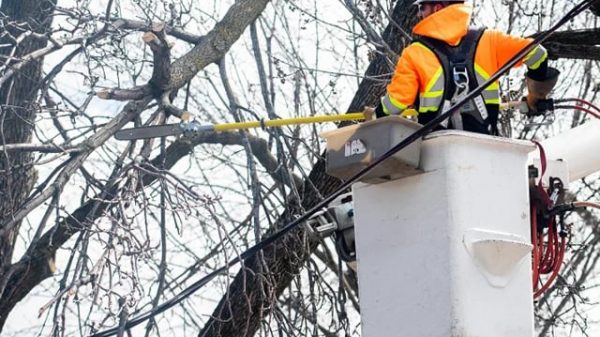Hundreds of thousands without power in Canada after ice storm

- Update Time : Saturday, April 8, 2023
- 53 Time View

Hundreds of thousands of homes in eastern Canada remained without power Friday, two days after an ice storm killed three people and caused widespread property damage, particularly in Montreal.
About 460,000 homes in Quebec were in the dark, down from 1.1 million at the height of the outages.
“We have restored power to over 50 percent of the customers affected by the outages,” said electricity provider Hydro-Quebec.
“Our teams are hard at work and we are confident that a further 200,000 customers will have their power back by the end of the day,” the utility company added.
Some homes though will be without electricity until Sunday, potentially Monday, said Hydro-Quebec spokesman Regis Tellier.
More favorable weather conditions should “accelerate the restoration of service,” he said.
Quebec Premier Francois Legault said that a third person had died from storm-related causes when he used a barbecue inside his home about 40 kilometers (25 miles) northwest of Montreal.
A resident of eastern Ontario was killed by a falling tree on Wednesday, and a 60-year-old Quebec man died when he was crushed by a tree branch while trying to clear his land early Thursday.
Montreal, which accounted for about half of the power outages, opened six temporary emergency shelters where residents spent the night.
At one, located in the Verdun neighborhood, about 30 people came to warm up, drink coffee, eat and charge their electronic devices on the first day of the long Easter weekend.
“It was mostly boring,” said 28-year-old teacher Isabelle, who declined to give her last name.
“I had planned to work and it delayed me a bit, but it’s not the end of the world,” she told AFP.
Rosalie Gouba, accompanied by her mother and two sons aged eight and three, said she was sorry to have had to throw away next month’s food supplies and to see the blackout continue.
“The first night was very difficult because I’m scared of sleeping in the dark. Since I am stressed, the children are too,” said the 30-year-old, who came with books to keep her boys occupied.
The storm affected Quebec and Ontario, Canada’s two most populous provinces.
Health officials in Montreal also recorded about 60 reports of carbon monoxide poisoning, after families used indoor barbecues to keep warm.
Hundreds of Montreal city employees were still cleaning up debris Friday, especially in parks where many branches had collapsed under the weight of the ice.
City parks, including Mount Royal, the hill overlooking the city, remained closed.
Temperatures of around one degree Celsius (33 degrees Fahrenheit) melted the ice, but wind gusts were shaking trees, risking more fallen branches.
Authorities were still advising people to stay away from power lines.
The power outage was the biggest in Quebec since an ice storm in 1998, which threw the province into chaos for several weeks.

























